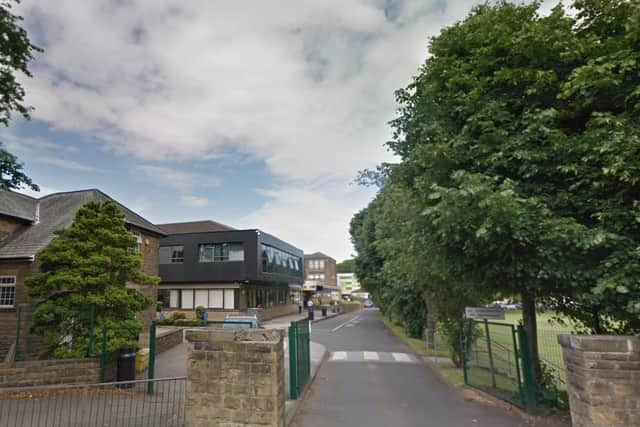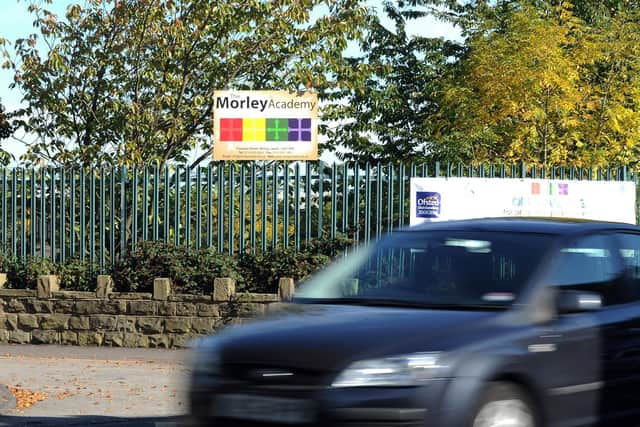Bubbles sent home as Covid cases confirmed at Morley Academy during GCSE period
and live on Freeview channel 276
Pupils in affected bubbles have been sent home and asked to self-isolate for 10 days, principal Adam Ryder said.
Mr Ryder said pupils would continue to receive the "highest quality remote education" while at home.
Advertisement
Hide AdAdvertisement
Hide AdYear 11 pupils are in the process of taking unseen assessments that will form part of their overall grades.


Due to the pandemic, teachers are able to draw on a range of evidence when determining grades, including mock exams, coursework or other work completed as part of a pupil’s course, such as essays or in-class tests.
Mr Ryder said: “Following two confirmed Covid-19 cases in our Year 11 cohort, and in line with Public Health England’s guidance, part of that year’s bubble has been asked to self-isolate for 10 days.
"As an academy we will work with students and parents to ensure that no child is disadvantaged due to following government guidance to self-isolate.
Advertisement
Hide AdAdvertisement
Hide Ad"Any student having to self-isolate will be allowed to take their unseen assessments that form part of our teacher assessed grades at a mutually agreed later date.


“Those having to remain at home will continue to receive the highest quality remote education, along with support from our pastoral colleagues.”
How are exams working across the country in the age of Covid?
– Will an algorithm be used to set grades?
No algorithm will be used by the regulator to standardise teachers’ grades if they appear too generous.
Advertisement
Hide AdAdvertisement
Hide AdThe decision comes after the grading of students became a fiasco last summer after exams were cancelled when schools and colleges closed.
Thousands of A-level students had their results downgraded from school estimates by a controversial algorithm before Ofqual announced a U-turn which allowed them to use teachers’ predictions.
But this year, teachers will submit their grades to exam boards by June 18 who will then carry out quality assurance checks through a combination of random sampling and more targeted scrutiny.
– Why are students receiving their results earlier than normal?
Advertisement
Hide AdAdvertisement
Hide AdNormally students receive their results in mid to late August.
But this summer, A-level students will receive their results on August 10 and GCSE pupils will receive their results two days later on August 12.
It is hoped that bringing forward the dates will ensure that A-level students have enough time to log any appeals so that they do not miss out on their preferred university place for the autumn.
– How can pupils challenge their grades if they are unhappy?
Advertisement
Hide AdAdvertisement
Hide AdEvery student will have the right to appeal their grade and they will face no additional costs doing so.
If pupils feel that their school did not go through the right process when issuing grades, or there has been an administrative error, they can appeal.
They will also be able to challenge grades if they feel that specific circumstances, such as a bereavement at the time of an assessment, were not been taken into account in the grading decision.
An application for an appeal will go through the school or college first where they will be asked to check for errors or process issues.
Advertisement
Hide AdAdvertisement
Hide AdIf a student is still unhappy with the grade, then the appeal can be raised with exams boards who will then assess whether the teachers’ judgment is fair.
Students will also be offered the chance to sit exams in the autumn.
– What will happen with vocational qualifications?
The results for some vocational qualifications will be released in the week of August 9.
Students studying vocational and technical qualifications, which are often taught alongside GCSEs and A-levels and are often used for university or college places, will receive grades assessed by teachers.
Advertisement
Hide AdAdvertisement
Hide AdThese qualifications include many Btecs and Cambridge Nationals.
Assessments will continue for qualifications that are used for direct entry into employment, where learners need to show occupational competence.
– How does England’s plans differ to the devolved nations?
In Wales, GCSE, AS-level and A-level students will receive grades determined by their teachers.
Education minister Kirsty Williams has said students will receive grades from their school or college based on work they have completed over the length of their course.
Advertisement
Hide AdAdvertisement
Hide AdIn Scotland, Higher and Advanced Higher grades will be decided by “teacher judgment supported by assessment” and no algorithm will be used to adjust results.
Meanwhile, in Northern Ireland schools will determine pupils’ GCSE and A-level grades.
Results days will remain as previously announced – A-levels on August 24 and GCSEs on August 27.
Support the YEP and become a subscriber today. Enjoy unlimited access to local news and the latest on Leeds United. With a digital subscription, you see fewer ads, enjoy faster load times, and get access to exclusive newsletters and content. Click here to subscribe.